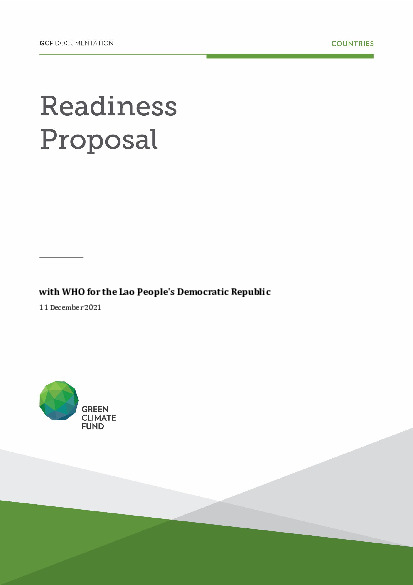Enhancing Lao PDR National Capacity and Coordination in Health and Climate Change

Enhancing Lao PDR National Capacity and Coordination in Health and Climate Change
Lao PDR is highly vulnerable to climate change and the related health risks, including an increased incidence of water and vector-borne diseases. Lao PDR has limited technical capacity of health systems and personnel to effectively integrate climate-related risks into interventions to control the burden of climate-sensitive health outcomes. Existing climate early warning systems managed by national meteorological organizations lack systematic coverage of observational data from regions and areas of the countries with high risks of climate-sensitive health outcomes. Climate information services are not adequately tailored to the needs of public health professionals. And primary healthcare facilities are not equipped to prepare for and respond to extreme weather and climate events, lacking information and cost-effective methods to provide health services.
Recognizing these challenges, in consultation with stakeholders, this Readiness project was designed to increase the adaptive capacity of national health systems and institutions, and sub- national actors, to respond to and manage long-term climate-sensitive health risks, specifically by strengthening the capacity of the Ministry of Health (MoH) to develop and manage climate-informed early warning systems for climate-sensitive diseases and by establishing a coordination mechanism to share data and knowledge among relevant sectors through the following GCF guided outcomes:
Outcome 1.3: Relevant country stakeholders have established adequate capacity, systems and networks to support the planning, programming and implement GCF-funded activities with training and workshop
Outcome 2.2: Lao PDR has developed or enhanced strategic frameworks to address policy gaps, improve sectoral expertise, and enhance enabling environments for GCF programming in low- emission investment
Outcome 5.1: Best practices with respect to institutional capacity building and coordination, direct access, and pipeline development are developed and disseminated to strengthen engagement by NDAs, DAEs, delivery partners, and government agencies
Outcome 5.2: Partnerships established to foster development and dissemination of methods, frameworks, and information systems for enhanced climate finance programming at subnational, national, and regional levels
The proposed Readiness project will ensure enhanced capacity of early intervention of the target climate sensitive diseases and systematized knowledge sharing mechanism with stakeholders and other relevant sectors
The direct beneficiaries of this project include all involved governmental staff, particularly CCH technical unit at the Department of Hygiene and Health Promotion of the MoH and key supporting units at the MoH and the MoNRE (approximately 60 number of professional) through direct training from international and local consultants, and meetings and workshops (total 10 meetings and workshops). Further, because the project focuses on enhanced health system resilience, reduction of climate-related health risks and vulnerabilities, the project will indirectly benefit the whole of the population of Lao PDR (approximately 7.1 million people).